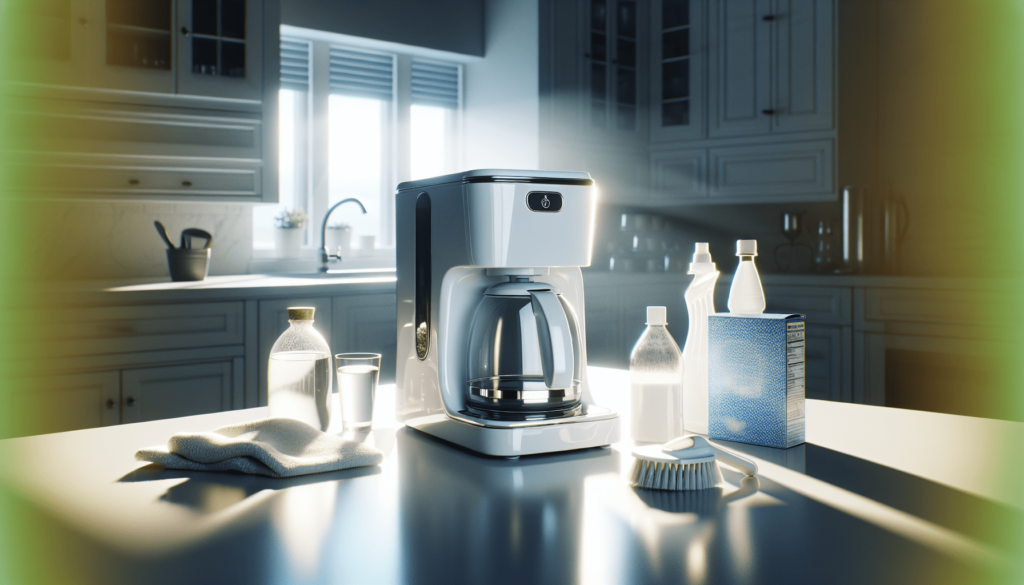Is vinegar or baking soda better for cleaning a coffee maker? This question might have crossed your mind, especially if you are an avid coffee drinker. A coffee maker is one of those essential kitchen appliances that need regular maintenance to continue delivering the perfect cup of joe. But when it comes to choosing between vinegar and baking soda for cleaning your coffee maker, which one is the better option? Let’s break it down and find out.
Understanding the Need for Cleaning Your Coffee Maker
Cleaning your coffee maker is not just about maintaining its appearance; it’s about ensuring the quality and flavor of your coffee. Over time, coffee makers can build up coffee oils, minerals from water, and other residues. This buildup can affect the taste of your coffee and could even harm the machine.
Common Issues from an Unclean Coffee Maker
- Bitter Coffee Taste: Old coffee residue can impart a stale or bitter flavor to your brew.
- Slower Brewing Time: Mineral buildup can clog the coffee maker’s internal parts, slowing down the brewing process.
- Shortened Lifespan: Not cleaning your coffee maker regularly can result in parts wearing out or breaking down prematurely.
Why Consider Vinegar or Baking Soda?
Vinegar and baking soda are popular household cleaning agents, known for their effectiveness and eco-friendliness. Before diving into their effectiveness for coffee maker cleaning, let’s understand their intrinsic properties.
Properties of Vinegar
Vinegar, particularly white vinegar, is acidic with a pH of around 2.5. This acidic nature helps in dissolving mineral deposits and killing various types of bacteria and mold.
Properties of Baking Soda
Baking soda, or sodium bicarbonate, is a mild alkaline compound with a pH of around 8.1. It is especially effective at neutralizing odors, acting as a mild abrasive to remove residue, and neutralizing acids.

Cleaning the Coffee Maker with Vinegar
Cleaning with vinegar is a popular method because of its effectiveness in dissolving mineral deposits.
The Cleaning Process
- Prepare the Vinegar Solution: Mix equal parts of white vinegar and water.
- Run a Brew Cycle: Pour the mixture into the coffee maker’s water reservoir and start a brew cycle.
- Pause Midway: Halfway through the cycle, pause and let the solution sit for about 30 minutes.
- Finish the Cycle: Resume and complete the brew cycle.
- Rinse with Water: Run 2-3 cycles of plain water to remove the vinegar odor and taste.
Pros and Cons of Using Vinegar
Pros:
- Effective Descaler: Highly effective in dissolving mineral deposits.
- Disinfectant: Kills bacteria and mold.
- Readily Available: Common household item and inexpensive.
Cons:
- Strong Odor: Some people find the vinegar smell unpleasant.
- Taste Residue: Requires thorough rinsing to avoid sour taste in coffee.
Cleaning the Coffee Maker with Baking Soda
Using baking soda is another method, known for its ability to neutralize odors and its mild abrasiveness.
The Cleaning Process
- Prepare the Baking Soda Solution: Dissolve 1/4 cup of baking soda in one quart of warm water.
- Run a Brew Cycle: Pour the solution into the coffee maker’s water reservoir and start a brew cycle.
- Pause Midway: Pause and let the solution sit for about 30 minutes.
- Finish the Cycle: Resume and complete the brew cycle.
- Rinse with Water: Run 2-3 cycles of plain water to ensure all baking soda is washed out.
Pros and Cons of Using Baking Soda
Pros:
- Odor Neutralizer: Neutralizes odors effectively.
- Mild Abrasive: Removes coffee residue.
- Chemically Safe: Safe for those sensitive to strong chemicals.
Cons:
- Less Effective on Scales: Not as effective at dissolving mineral deposits as vinegar.
- Dissolution Issues: Needs to be fully dissolved to avoid clogging.

Final Comparison of Vinegar and Baking Soda
Let’s compare vinegar and baking soda side-by-side to help you decide which one might be better for your coffee maker.
| Feature | Vinegar | Baking Soda |
|---|---|---|
| Effectiveness on Scale | Excellent | Moderate |
| Odor Neutralization | Moderate | Excellent |
| Chemical Safety | Acidic (use caution) | Safe |
| Ease of Use | Straightforward but odor remains | Easy but requires thorough dissolution |
| Cost | Low | Low |
| Availability | High (common household item) | High (common household item) |
Best Scenarios to Use Each Cleaning Method
- Vinegar: Ideal if your main concern is mineral buildup and disinfecting. It’s especially helpful if you haven’t cleaned your coffee maker in a while or if you live in an area with hard water.
- Baking Soda: Best for regular maintenance, especially if you’re more concerned about neutralizing odors and removing coffee oils. Perfect for those who prefer avoiding strong chemical odors.
Additional Tips for Maintaining Your Coffee Maker
Regular maintenance is key to extending the lifespan of your coffee maker and ensuring a great-tasting cup of coffee every time. Here are some additional tips to keep your coffee maker in top shape.
Regular Rinsing
After each use, rinse the removable parts like the carafe, filter basket, and lid with warm water. This prevents the coffee oils from building up and extends the intervals between deep cleanings.
Monthly Deep Cleaning
Regardless of whether you choose vinegar or baking soda, aim to deep clean your coffee maker at least once a month. This will prevent any significant buildup of residue or minerals.
Replace Water Filters
If your coffee maker has a built-in water filter, replace it as recommended by the manufacturer. This helps in reducing scale buildup and improves the taste of your coffee.
Descale Regularly If You Have Hard Water
If you live in an area with hard water, you might need to descale your coffee maker more frequently. Using a commercial descaling product in addition to vinegar can be more effective in such cases.
Inspect and Clean the Spray Head
The spray head, which disperses water over the coffee grounds, can become clogged with minerals or coffee oils. Periodically remove and clean the spray head to ensure optimal performance.
Conclusion
So, is vinegar or baking soda better for cleaning a coffee maker? The answer depends on your specific needs and preferences. Vinegar is highly effective at dissolving mineral deposits and disinfecting, making it a great choice if scaling is your main concern. Baking soda excels at neutralizing odors and removing coffee oils, making it ideal for regular maintenance.
Both vinegar and baking soda are excellent, eco-friendly choices that are readily available and inexpensive. Understanding their unique properties and how to use them effectively will help you maintain your coffee maker efficiently. Regular care and cleaning will not only extend the life of your coffee maker but also ensure that every cup of coffee you brew is as delicious as the last.
